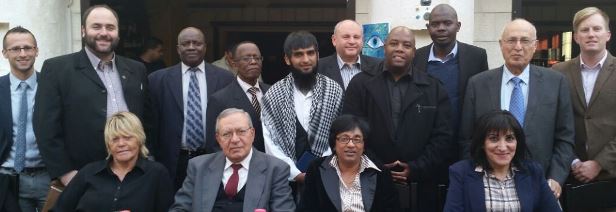click to dowload our latest edition
CLICK HERE TO SUBSCRIBE TO OUR NEWSLETTER


Published
9 years agoon
By
adminANT KATZ
The delegation included Mokgalapa, Glynnis Breytenbach, Yussif Cassim, Michael Bagraim, Darren Bergman, Sandy Kalyan, Dean Macpherson and Makashule Gana from various Parliamentary portfolios. These were: International Relations; Justice; Human Settlements; Trade & Industry; Labour; Sports & Recreation; and Higher Education and Training.
The trip was solely funded by SAIF (South Africa Israel Forum), says the DA.
The delegation met with the deputy mayor of Tel Aviv Mehereta Maruch Ron, who is an Ethiopian immigrant. She highlighted her role in social development and upliftment of the poor in Tel Aviv. Roughly one third of the population of Tel Aviv are Ethiopians.
They were also introduced to the Innovation Africa programme which has provided solar energy to 86 African villages by to drive drills and water pumps. This provides water to clinics, schools and villages in Uganda, Tanzania, Malawi and South Africa.
The delegation met SA Ambassador to Israel Sisa Ngombane, who highlighted the services the embassy provides. Ngombane took the delegates through the complexity of the Middle East conflict. South Africa, he told the DA delegation, enjoys good trade relations with Israel which are worth about $400-mil a year – and that “business is doing well.”
Emily Neilson, the director of the Christian Empowerment Council, provided a historic overview of the Israel/Palestine conflict and the issue of borders and the rise and fall of the Oslo Peace Accords.
 The DA delegation and hosts enjoying Israeli hospitality
The DA delegation and hosts enjoying Israeli hospitality
The key issues of the conflict that they took away with them, said delegation leader Stevens Mokgalapa in his report to the party, are: Land; Refugees; and Jerusalem.
Neilson had highlighted different complexities around the territories, the fact that there are 22 different minorities and the proposal for land swaps.
The SA MPs also met Intelligence and Strategic Affairs Minister, Yuval Steinitz, “who shared with the delegation that Israel has a right to existence and self-determination. Israel is ready to dismantle settlements if peace is achieved with Palestine,” reported Mokgalapa. Israel had previously withdrawn from Sinai (Egypt) and Gaza.
Mokgalapa reported back that “Israel is concerned about the nuclear threat from Iran and threat of extremism by ISIS in Syria and Iraq. Israel has a right to defend itself,” he said in his report.
The MPs visit the Nazareth Industrial hub, a regional business incubator hosting companies owned by Arabs, Jews, and Christians. The 100-odd companies are mainly export orientated, employ 3,000 people and contribute $700-mil to the economy annually. They also visited a Druze community (Druze make up eight percent of Israelis). The Druze, explains Mokgalapa in his report-back to the DA, “Believe in respect and honour. They have Muslims and Christians amongst them they originate from Lebanon and Syria. They have been in Israel for 400 years, believe that men and women are equal, and read their own bible which is the book of wisdom.”
The DA MPs also met with Arab human rights activists and academics, most notably Bassem Eid, who created a Palestinian human rights body in 1966. “He was vocal in exposing Palestinian corruption and internal Palestinian conflict,” says the report. Eid had highlighted the need to disarm Hamas and hand control of Palestinian borders to Mahmood Abbas’ Fatah movement. He also emphasised the “critical role played by Iran” in terms of financial and military support for Hamas. Israeli Arabs enjoy economic prosperity, jobs, education and health-care.
Eid told the delegation that “the role that BDS play is equal to genocide as Arabs lose jobs.” The closure of the Soda Stream factory in the West Bank, he said, had cost 2,500 Palestinians their jobs.
The delegation met Palestinian Journalist Khaled Abu Tomah who highlighted that the West Bank has no media freedom. Hamas’ power is growing, he said, and that Palestinians are historically secular and want to attain a better life through job creation and economic success.
Dr Nabeel A Shaath, a PLO Member of the Palestinian Legislative Council, told the MPs that the West Bank was inextricably linked to Israel. The internet network connection is controlled by Israel and 95 percent of West Bank imports are from Israel. Palestine relies on Israel for food, medical supplies and energy.
Others who the DA MPs met included: Professor Ada Rafeili, Associate Director for Academic Affairs and International Co-operation at Hebrew University; Advocate L Marc Zell, an international law specialist at Ariel University; International Law expert Professor Robbie Sabel; the Mayor of Jerusalem Mr Nir Barkat;
The delegation also visited Ramallah, the seat of the Palestinian government. “It is a secular city,” says the Mokgalapa report, where “the private sector is bigger than the public sector.”
Among the other sites visited were a military base; a kibbutz on the Gaza border where rockets fell daily; Black Arrow, the area where the rockets were fired from in the summer war from Gaza and where the tunnels were uncovered and dismantled
The Mokgalapa report lists among the challenges it faced as being: The withdrawal of some speakers and guests from the Arab Palestinian side; and the alleged leaking of their programme to BDS which, they say, might have led to the withdrawals.
This serves to fortify what several delegates had mentioned to Jewish Report who had been suspicious that one of their own may have been reporting information to BDS-SA. Jewish report understands that this matter was investigated, but not proven, on the group’s return to SA.
In terms of what the DA delegation learned, they say, were that there are trade possibilities between SA and Israel; and that “SA can benefit from”: High Tech Innovation of Israel; Agrotech Techniques; Exchange programmes of students; Start-up models; The Kibbutz system that Israel uses as Co-ops; The integration of societies such as Druze, Arabs Jews and Christians; and Military expertise and intelligence.
Stevens Mokgalapa’s report concludes that “The delegation benefitted from the study tour immensely.”
